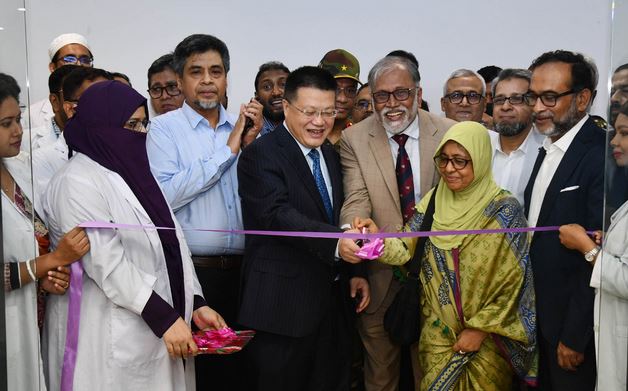News Flash
News Flash

DHAKA, Aug 31, 2025 (BSS)- Bangladesh’s first ever robotic rehabilitation centre launched at Bangladesh Medical University (BMU) has unveiled a new horizon of advanced medical care for persons with disabilities and patients suffering from paralysis.
The pioneering facility opens up a new frontier in therapeutic innovation, offering state-of-the-art robotic assistance to enhance recovery and mobility for patients with long-term neurological conditions.
Health Adviser Nurjahan Begum today officially inaugurated the robotic rehabilitation centre, where a dedicated team is supported by 57 cutting-edge robots, 22 of which are powered by artificial intelligence.
This advanced setup is designed to deliver highly precise physiotherapy and a range of sophisticated medical treatments, marking a transformative step in patient care.
About the centre, Professor Dr Md Abdus Shakur, Chairman of the Department of Physical Medicine and Rehabilitation and Head of the Robotic Rehabilitation Center, highlighted that the rarity of such facilities in South Asia, saying that the center is enabled for highly accurate physiotherapy and advanced rehabilitation services.
He added, “To ensure smooth operation, a team of seven biomedical experts from China has conducted specialized training for 29 local doctors and physiotherapists.”
He continued, among the first beneficiaries are individuals injured during the student-led mass uprising in July, many of whom require long-term care. These patients are receiving robotic rehabilitation services entirely free of charge.
Dr. Shakur further said that the center will gradually open its doors to the general public, with service costs kept affordable for ordinary citizens.
Established with technical support from China and modeled after facilities in advanced nations, the center received a donation of cutting-edge robotic equipment valued at approximately Tk 30 crore from the Chinese government, he revealed.
This contribution has helped the facility to be one of the most sophisticated robotic rehabilitation centers in South Asia, he said.
He went on saying the inauguration of this center marks a transformative moment in Bangladesh’s healthcare landscape, ushering in a new era of medical innovation and offering renewed hope to individuals suffering from paralysis and neurological disorders.
Dr. Shakur noted that with this facility now operational, patients who once had to travel abroad for treatment can now access world-class care locally, significantly reducing the outflow of foreign currency.
After the inauguration the Health Advisor visited different sections of the Robotic Rehabilitation Center, established in the basement of the Super Specialized Hospital.
In her speech, Nurjahan Begum said that the Robotic Rehabilitation Center at BMU must be made sustainable and decentralized as far as possible.
“In particular, we must ensure that such services are extended to three or four other districts as well. BMU is a large institution with vast potential. We believe great things can happen here, and the services delivered here will eventually spread nationwide,” she said.
The Adviser expressed her sincere gratitude to the Government of China for its support in establishing the center. She said, “When I first visited the hospital after assuming office, I saw many patients who had lost limbs, or whose arms and legs had become non-functional. At that moment, I began thinking about how to provide them with better treatment.”
“I requested China to provide 10 to 15 robots to help us begin the treatment process. But they generously provided us with 57 robots. Additionally, a Chinese delegation trained up 29 of our professionals. I also emphasized that our people must receive necessary training to maintain the robots, making this center sustainable,” she added.
Speaking on the occasion as special guest, Chinese Ambassador Yao Wen expressed heartfelt gratitude to Chief Adviser Professor Muhammad Yunus for his recent visit to China.
He said that China, as a trusted and long-standing friend, has consistently supported Bangladesh’s development, especially in the health sector, and reaffirmed that the country will continue to extend full cooperation to improve healthcare facilities in Bangladesh.
The envoy said that as a gesture of this friendship, China has provided international-standard equipment for the newly inaugurated Robotic Rehabilitation Center, and such support will only increase in future.
He also highlighted China’s swift support in treating burn victims from the recent aviation tragedy involving Milestone School and College students, and said China is facilitating low-cost advanced treatment for Bangladeshi citizens while continuing to aid the country’s healthcare development.
Chief Adviser's Special Assistant Professor Dr Md Sayedur Rahman said that BMU is poised to become a central hub for the transfer and implementation of the world’s most advanced medical technologies. He expressed hope that these innovations would soon spread from BMU to every corner of the country's healthcare system.
Speaking as the chair, BMU Vice Chancellor Professor Dr Shahinul Alam described the inauguration of the Robotic Rehabilitation Center as a historic day for the institution as this marks the formal beginning of AI-based medical services in the country.
The center will serve as a "Training of the Trainers Facility”, enabling the dissemination of specialized skills across the nation, he said, reiterating the university’s commitment to transforming BMU into a smart, AI-driven medical institution.
With Registrar Professor Dr. Md. Nazrul Islam and Assistant Proctor Dr. Rifat Rahman moderating the event, several distinguished dignitaries were present.
Among them were Director General of the Directorate General of Health Professor Dr. Md. Abu Zafar, Pro-Vice Chancellor (Administration) of BMU and Chairman of the Rehabilitation Center Implementation Committee Professor Dr. Md. Abul Kalam Azad, Pro-Vice Chancellor (Research and Development) Professor Dr. Md. Mujibur Rahman Howlader, and Treasurer Professor Dr. Nahrin Akhter.